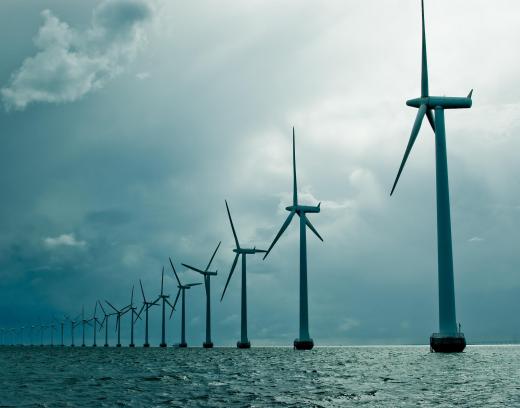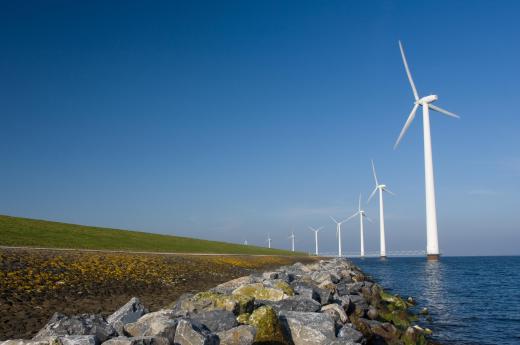What is a Wind Farm?
 Mary McMahon
Mary McMahon
A wind farm is a collection of windmills or turbines which are used to generate electrical power through their mechanical motions as they are pushed by the wind. Both Europe and the United States have large numbers of wind farms, and the technology is also found on other continents. In Asia, India especially has devoted a great deal of funding to establishing such farms. The energy generated by these farms can be fed directly into the general energy grid after passing through transformers.
As a potentially large source of renewable energy, wind farms are particularly popular in nations which are focusing on alternative energy. Other types of renewable energy include wave power and solar arrays. All of these technologies take advantage of already existing energy, converting it into a usable form. Since a wind farm does not actively deplete resources as it generates power, it is considered a form of “green” energy.

Naturally, some resources must be expended to create a wind farm. The turbines, transformers, and grid system on a farm are often made from less than ideal substances, such as metals mined in an unclean way. However, once installed, the farm requires no additional energy output other than that required for basic maintenance. This is a marked contrast to a power plant which relies on coal or petroleum products.

Naturally, the best place for a wind farm is a windy location. In some instances, a windy location may also be generally unusable or uninhabitable. In other instances, a wind farm may take up useful real estate which could be used for farming. This has led to some criticism of these farms, since they take up a great deal more space than a comparable non-renewable energy generating facility. In addition, these farms pose a severe threat to migratory birds, as has been clearly documented by several scientific organizations.

These issues aside, the technology is generally believed to be environmentally sound and fiscally viable. Especially if the farms are combined with other renewable energy sources, green energy could make up a bulk of the power grid. This could have a huge impact on the environment and on society in general. Especially at the end of the twentieth century, when a growing number of citizens began to call for energy reforms, wind farms held a great deal of promise.
AS FEATURED ON:
AS FEATURED ON:















Discussion Comments
I just wanted to add that there are other ways for people to invest in wind energy. People can invest directly in a community wind power farm. these are utility scale farms that are organized in a manner to take advantage of certain tax breaks given only to community wind farms, while selling the debt so that the development can take advantage of large tax incentives that would only be useful for an investor that carries a high tax liability (like a large corporation). The benefit of these is the money stays in the local community, communities have a sense of ownership, all of the jobs associated with construction and maintenance remain in the community, and environmentally domestic energy is produced. There are a lot of resources out there for people interested in investing in community generated wind power.
@ aplenty- You are absolutely right about bird strike. Wind farm siting requires that bird strike studies be done, and they have to be sensitive to the migratory paths of birds. Wind developers also must report any and all bird strikes by their windmills. The birds that are killed at these sites are actually collected by the maintenance crew.
The biggest problem with windmills is they actually cause a large number of bat deaths. The change in pressure caused by the spinning blades causes bats lungs to explode. As bad as this may sound, the fact is developers are taking this into account when siting new wind farms.
It is actually a misrepresentation that windmills kill flocks of migratory birds. They actually kill very few birds compared to other sources. A federally commissioned study into the bird strikes by wind farms, concluded that they kill less than 1 bird of every 10,000 birds killed by human causes. The biggest killers of birds happen to be buildings and cats, accounting for 60% of all bird deaths. I don't think people are necessarily interested in banning kittens and buildings for any practical reasons.
There will be trade-offs to everything, but to claim that wind mills will turn birds into endangered species is just fearful rhetoric that is disseminated to the public by parties interested in preventing wind farm development. Wind project developments tend to go through phases. Initially there is a lot of public support, during the siting and construction phases, wind developments often experience a public backlash. Finally, after they are installed, they regain public support, often stronger than initial support.
it is a electricity building.
Post your comments